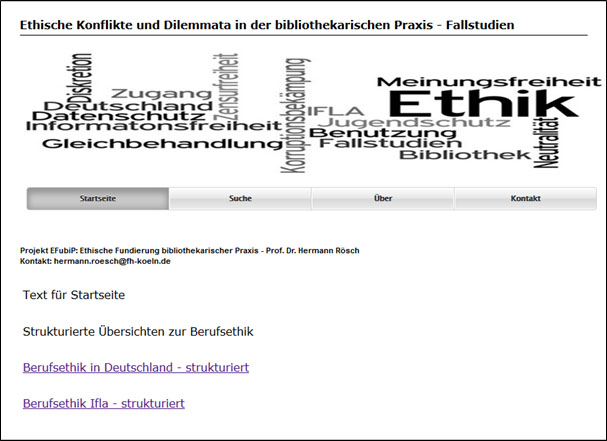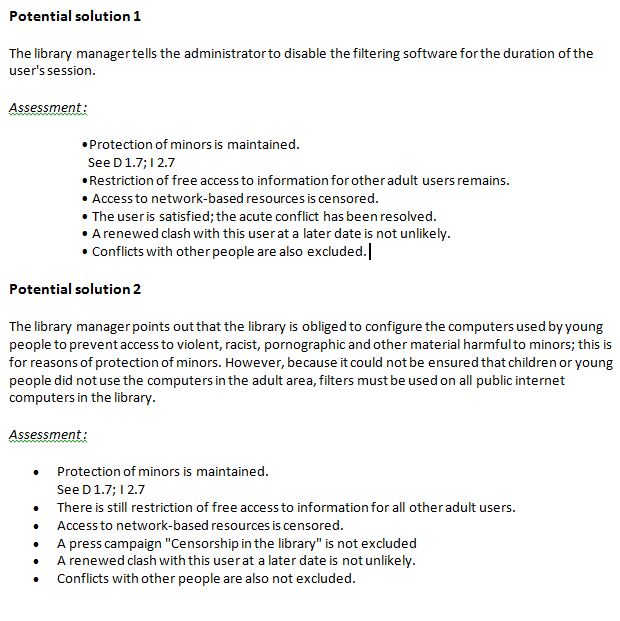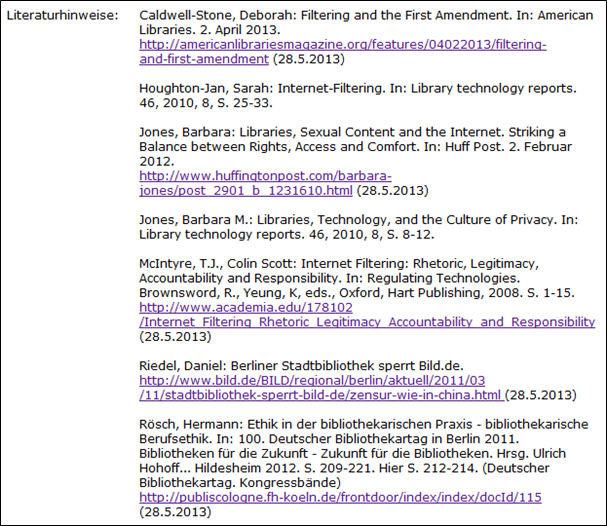Edili: Ethical dilemmas for librarians and other information workers: case studies

Ethical foundations of library and information work – Introduction
Contents
6.2 Case description 6.3 References to values 6.4 Potential solutions 6.5 References 6.6 User comments |
We would appreciate it if you would enrich the case studies with your comments and a description of your own experience. Please fill in the form at the end of the relevant case study. Have you experienced interesting cases that could be included in the database? If you have, please contact the project manager, Hermann Rösch Thank you very much. |
- Preliminary remarks This project presents 27 case studies of ethical dilemmas and conflicts that typically occur in libraries. Work on the project began in the summer semester of 2013. The project leader is Professor Hermann Rösch, Institute of Information Science, Cologne University of Applied Sciences. Continuing expansion of the case study collection is planned
- Conflicts and dilemmas ConflictsConflicts occur when different interests and values preclude an amicable solution. For example, if a fundamentalist follower of a religious community requires that all art, media and information that contradict the basic beliefs of that religion be removed from the library’s collection, there is a conflict between this particular interest and the library’s core values of freedom from censorship and freedom of access to information. Therefore, this is not a dilemma, but a conflict that must clearly be resolved according to library and information codes of ethics: the censorship request must be rejected, because the purpose of the library is to provide unrestricted access to the entire spectrum of opinion and ideology. However, a dilemma exists when the various resolutions of a situation are in conflict with different ethical values of library and information workers. Use of the library by homeless people is initially to be welcomed because the library offer is also open to disadvantaged people. However, if a homeless person using the library were in such a state that other users complained, for example about smell, a decision must be made that violates a fundamental value: either that of equal treatment, where the homeless person is provisionally banned from the library, or that of the professional, user-oriented presentation of collections and services if the homeless person were allowed to stay in the library with the result that other users leave the building because of the smell. These examples make clear that there is no lack of conflicts and dilemmas in library and information work. But it is important that the core values of library and information work are taken into account when resolving such issues. All too often, however, decisions are made from a purely subjective point of view due to a lack of awareness of the problem; they are based on so-called "common sense" or on legal frameworks whose relevance is assumed. In particular,"common sense" is not a verifiable general standard, but a contingent, often highly subjective attitude, which is declared to be universal.
- 3. Relation to professional codes of ethics for library and information workers Professional codes of ethics aim to ensure that the decision-making process for resolving practical conflicts and dilemmas has an ethical basis. These codes should be instrumental in determining conflict resolution; in spite of certain contextual variants, they should lead to standardised action that meets the expectations of the parties involved. Professional codes of ethics for library and information work – i.e. a compilation of essential values and attitudes – play an important role in this context. It is essential that professional ethics exist not only on paper, but are present in work-related thinking, planning and action, so are actually "lived". Case studies can provide a significant contribution to the dissemination and discussion of professional ethics. The case studies presented here are closely linked with the national professional code of ethics in Germany ("Ethical Principles of the Library and Information Profession") and its international counterpart ("IFLA Code of Ethics for Librarians and other Information Workers"). In the literature, professional codes of ethics are classified as "mandatory" / "prescriptive" /"regulatory" on the one hand and as "aspirational" / "inspirational" on the other (see Koehler / Pemberton 2000, Sturges 2009). The difference is that the former follow the Kantian concept of the ethics of duty and prescribe behaviour. Professional codes of ethics as the ethics of duty are based on a moral rigour that often calls for sanctions when certain rules are violated. In contrast to this deontological approach, the second group of the category of the ethics of responsibility is close to Weber's sense (cf. Weber. 1919). The choice of a particular behaviour should take into consideration specific contexts and the likely consequences to be expected. It may be that in this kind of professional code of ethics there are no binding rules that must be strictly observed. Instead, ethics is understood as a reflection of moral behaviour (cf. Luhmann 2008). The IFLA Code of Ethics is clearly an "aspirational code of ethics". The preamble states: "This Code of Ethics and Professional Conduct is offered as a series of ethical propositions for the guidance of individual librarians as well as other information workers...". Therefore it is definitely not a question of rigid rules and irrevocable obligations. In addition, the dependence on cultural context is acknowledged: "IFLA recognises that whilst these core principles should remain at the heart of any such code, the specifics of codes will necessarily vary according to the particular society, community of practice or virtual community." Nevertheless, these international codes of ethics have the task of compiling the basic values of library and information work to facilitate reliable ethical decisions. They are intended to provide guidance, standardisation and decision-making based on ethical reflection. The case studies presented here assume an "aspirational code of ethics". Therefore, there are no "right" and "wrong" solutions to the individual cases of conflict; several possible solutions are presented along with their ethical implications and references to the professional codes of ethics. Users of the database should be able to make their own decision on the basis of these suggestions.
- Purpose of the collection of case studies
Professional codes of ethics contain rather general statements such as "We reject censorship of content" (Ethics 2007).
In practice, it quickly becomes evident that exceptions must be made in certain cases, such as when child protection is involved.
Not infrequently, colleagues doubt the practical value of their professional ethics because it is difficult for them to relate the general statements to their everyday professional practice.
The case studies should close this gap. They present practical everyday situations, analyse their values and relate them to codes of ethics. Professional codes of ethics are thereby given life.
In this respect, professional codes of ethics and case study collections are complementary.
Moreover, the case studies presented here help to:
- create awareness of the ethical aspects of everyday phenomena
- stimulate the ethical reflection of one's moral behaviour
- increase ethical responsibility
- make it clear that in principle there are policy options
- to make it clear that individual cases are dependent on context
- promote the standardisation of ethical conduct
- increase awareness of national and international ethics for library and information work
- encourage users to describe their own experience by commenting on the cases in the space provided for this purpose.
- Source of material The case studies were partly based on actual conflicts that have been documented in the literature or discussed in library discussion lists – mainly InetBib (Internet in Bibliotheken: Internet in Libraries) and ForumOeB (Forum Oeffentliche Bibliotheken: Public Libraries Forum). Some were specifically developed scenarios to cover as many potential areas of conflict as possible. References have been given where they exist. Attention is also drawn to secondary literature that addresses a topic covered in a particular case.
- Structure of the case studies
The individual cases are presented in a multi-stage structure:
Metadata6.1 Metadata First, information about the case study is provided:
Case description
References to valuese
Solutions
References
User comments
Title
Keyword
Classification
Type of library
Place
Field of activity
Reference to values
Author

Figure 1: Metadata6.2 Case description At this stage, the case is described in detail.
Figure 2: Case report6.3 References to values The third stage is reserved for references to values. This section points to the relevant values relating to the case study from the German code of professional ethics ( Ethics 2007) and IFLA’s international code of professional ethics (IFLA 2012), which was adopted in 2012. Zu diesem Zweck wurden beiden Dokumente im Detail analysiert und die einzelnen Aussagen nummeriert und mit Kurzbezeichnungen versehen. Zur Unterscheidung wurde den Aussagen der Ethischen Grundsätze ein „D“ vorangestellt, jenen des IFLA-Kodex ein „I“. For this purpose, the two documents were analysed in detail and the statements were numbered and provided with abbreviations. To distinguish between the two codes, statements from the German code were preceded by a "D" and those from the IFLA Code by an "I". Figure 3: Reference to valuesTexts categorized in this way are available on the home page of EFubiP database:
Figure 3: Reference to valuesTexts categorized in this way are available on the home page of EFubiP database:
Figure 4: Structured professional codes of ethics6.4 Potential solutions This section offers are several potential solutions of the case described (maximum 4). The individual solutions are analysed in terms of their consequences. The basic ethical values concerned in the case study, which are explicitly mentioned in the two professional codes of ethics, are referred to by abbreviations (e.g. D 1.7; I 2.7).
Figure 5: Potential solutions with reference to professional codes of ethics6.5 References At this point, the sources that mention the case study or describe it in detail are provided along with secondary literature in which the topic is treated in detail.
Figure 6: References6.6 User comments The last section offers users the chance to provide feedback on the individual cases. Corrections, additions, critical comments or tips on personal experiences or additional cases are also welcome. - Use of the database EFubiP/Edili is intended to promote job-related ethical reflection of librarians and others working in the information sector. It is hoped that the case studies will be used in the framework of study and training, as well as by colleagues who are concerned with ethical issues of their own accord. Furthermore, we would like the database to be gradually improved and expanded by user comments and other feedback.
- References
Ethische Grundsätze 2007
Ethische Grundsätze der Bibliotheks- und Informationsberufe. Bibliothek und Infor-mation Deutschland (BID). 2007. www.bibliotheksportal.de/themen/beruf/berufsethik/code-of-ethics-bid-2007.html (2.9.2013). IFLA-Ethikkodex 2012
IFLA-Ethikkodex für Bibliothekarinnen und andere im Informationssektor Beschäftige. International Federation of Library Associations and Institutions. 2012. www.ifla.org/files/assets/faife/codesofethics/germancodeofethicsfull.pdf (2.9.2013). Koehler/Pemberton 2000
Koehler, Wallace u. Michael J. Pemberton: A Search for Core Values. Toward a Model Code of Ethics for Information Professionals. In: Journal of Information Ethics. 9, 2000. H. 1. S. 26–54. Luhmann 2008
Luhmann, Niklas: Ethik als Reflexionstheorie der Moral. In: Ders.: Die Moral der Ge-sellschaft. Frankfurt a.M.: Suhrkamp 2008. S. 270-347. Sturges 2009
Sturges, Paul: Information Ethics in the Twenty First Century. In: Australian Aca-demic & Research Libraries, 40(4), 2009, S. 241-251. http://www.ifla.org/files/assets/faife/publications/sturges/information-ethics.pdf (2.9.2013). Weber 1919
Weber, Max: Politik als Beruf. München, Leipzig: Duncker und Humblot 1919.